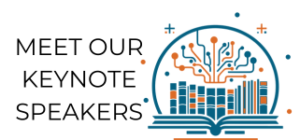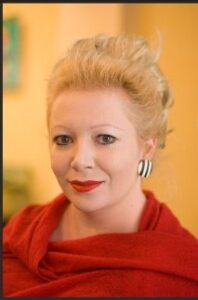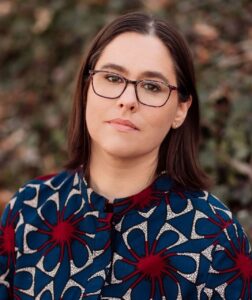
Announcing the Keynote Speakers for VALA2024!
Our six keynote speakers are at the centre of the conference, and showcase some of the most inspiring and creative professionals in the GLAM IT sector.
Details about the speakers and presentations will be included below as they are available.
Keynote
Trumped Literacies: A new model for information and knowledge in claustropolitan times
Tara Brabazon
 Tara Brabazon is the Professor of Cultural Studies at Flinders University, Fellow of the Royal Society for the encouragement of Arts, Manufactures & Commerce (RSA), Member of the College of Distinguished Educators, and Director of the Popular Culture Collective. She has worked in ten universities in four countries and most of the states and territories of Australia. Tara has held the leadership roles of Dean, Head of School, Head of Department, Head of Programme and Institutional Research Leader of national assessment exercises.
Tara Brabazon is the Professor of Cultural Studies at Flinders University, Fellow of the Royal Society for the encouragement of Arts, Manufactures & Commerce (RSA), Member of the College of Distinguished Educators, and Director of the Popular Culture Collective. She has worked in ten universities in four countries and most of the states and territories of Australia. Tara has held the leadership roles of Dean, Head of School, Head of Department, Head of Programme and Institutional Research Leader of national assessment exercises.
Tara is currently writing three books, on academic failure, the Claustropolitan University and Claustropop: Popular culture at the end of the world. She is a columnist for the Times Higher Education, produces audiobooks, and runs a successful and popular podcast programme (since 2008). Tara has developed the genre of academic vlogs for higher degree students, through her weekly series.
She will be presenting on her latest work at VALA. “Trumped Literacies: A new model for information and knowledge in claustropolitan times”, which will explore how librarians, educators and information professionals manage the speed of mis/information while enabling debate, diversity and expertise?
Keynote
The Interdependent Library System: Revisiting Human Aspects of Library Automation
Ruth Tillman

Ruth Kitchin Tillman works on discovery, the library catalog, and linked data projects at Penn State University Libraries. Her current research focuses on library systems and the people who use and maintain them. She has written and presented on metadata encoding standards, library discovery, linked data, institutional repositories, and labor issues in libraries.
Ruth will be presenting: The Interdependent Library System: Revisiting Human Aspects of Library Automation
Once the star of the library technology circuit, the integrated library system (ILS) has long taken a back seat to emerging technologies—from the repositories of the late aughts to the AI of the mid-twenties. Yet the ILS is more than the origin of library automation; it still underlies the everyday work of a 21st century library.
In this presentation, Ruth considers the ILS as workspace and re-envision it as a system that is as fundamentally as human as it is technological. What can we learn by re-engaging with this apparently-monolithic and oft-monopolistic presence in our workplaces? She draws from the oral histories of Penn State’s homegrown ILS (1970s-1998) and her research into library systems maintenance and into the impacts of present-day ILS migration.
Keynote
Connected Curiosity
Dr Melissa Silk
 Dr Melissa Silk is JMC Academy’s National Head of Design. With over thirty years of creative practice, Melissa collaborates with many thinkers and makers to design experiences that embed the Arts in Science, Technology, Engineering and Mathematics (STEAM).
Dr Melissa Silk is JMC Academy’s National Head of Design. With over thirty years of creative practice, Melissa collaborates with many thinkers and makers to design experiences that embed the Arts in Science, Technology, Engineering and Mathematics (STEAM).
Melissa is co-director of STEAMpop.zone while also engaged in research contributing to learning ecologies spanning creative intelligence and innovation, transdisciplinary education, and designing for preferred futures. Melissa enjoys being part of a bold community of multipotentialities intent on developing and sharing unique learning experiences for everybody.
Dr Silk will be presenting a keynote titled: “Connected Curiosity” – a visual treat and overview of creative practice steeped in transdisciplinarity. It tracks the development of innovative tasks and activities related to embedding the Arts in STEM, delivered in institutional education and general community contexts. Enter the fusion acronym: STEAM.
We know that STEM represents science, technology, engineering and mathematics, and here, we are reminded that the arts include humanities, language, arts, dance, drama, music, visual arts, design and new media. However, beyond the acronym, STEAM is an experience. Connected Curiosity champions the notion of shifting ideas and perceptions of ‘learning’ into dynamic transformative experiences.
Transcending discipline boundaries, STEAM integrates seemingly disparate practices. Root Bernstein (2019) advocates innovation being the result of taking transdisciplinary leaps of imagination by training scientists, technologists, engineers, and mathematicians in and of the arts. Such integration is hard work and tricky. Hence, a significant aspect presented here is the consideration of personal and individual transformation through connected experiences, in which the dynamic contribution of dialectical emotions is appreciated and valued.
Keynote
The once and future librarian
Donna Benjamin
 Librarians are vanguards of infotech. Struggling with legacy systems accumulated alongside precious collections of books, journals, tools, and toys. Watching waves of uncertainty in a world newly obsessed with AI, we may well wonder what’s next. Let’s pause and reflect on the journey that got us here. Let’s examine the messy middle of our present. Let’s do more than imagine where to go now. Let’s re-make the future. Let’s iterate, and re-iterate.
Librarians are vanguards of infotech. Struggling with legacy systems accumulated alongside precious collections of books, journals, tools, and toys. Watching waves of uncertainty in a world newly obsessed with AI, we may well wonder what’s next. Let’s pause and reflect on the journey that got us here. Let’s examine the messy middle of our present. Let’s do more than imagine where to go now. Let’s re-make the future. Let’s iterate, and re-iterate.
The Open Practice Library has no books, no bricks, no mortar. It has no systems to manage loans. It’s a collection of practices, open to all to use, to study, to change, and to share.
In this closing address, Donna Benjamin will invite attendees to take the first step into their own future, empowered by their own legacy, enabled by open practices, and fueled with optimistic intent for what’s possible.
Donna is Maintainer & Product Owner, Open Practice Library, a Keynote Speaker and Senior Engagement Lead, Red Hat Open Innovation Labs.
Over the years Donna has taken on a range of leadership roles in the Australian Open Source community, sitting on boards and committees and organising events.
Donna has served as a layperson on the Human Research Ethics Committee of the Victorian Cancer Council.
Donna’s background in marketing and theatre underpins her belief that ‘the show must go on’. The web is a stage for many individuals and companies. It delivers incredible opportunities to communicate with their audience, whether that’s members, learners, customers or constituents.
Donna prepares and presents customised keynote sessions that motivate people to act by taking their first step into the future.
Keynote
Sites of resistance in the digital age
Hero Macdonald & Tui Raven


This presentation will explore the function of knowledge organisation systems, including libraries, as powerful apparatuses that not only reflect dominant cultural norms and power dynamics but also actively construct and perpetuate them. In the context of an increasingly privatised information landscape, and new forms of digital colonialism being led by Big Tech, biases are not only entrenched but also magnified in numerous ways. By critically interrogating and addressing the deeply embedded biases within the library profession itself, this discussion will explore both the possibility and the imperative for libraries to actively reconceptualise themselves as important sites of resistance in the digital age.
Keynote
The machines won’t save us
Dr. Keir Winesmith
 Dr. Keir Winesmith is the Chief Digital Officer at the National Film & Sound Archive (NFSA), mentor in the Creative Australia’s CEO Digital Mentoring Program, and co-founder of the bi-monthly Cultural Data Salon for Sydney cultural workers. His book, co-authored with Dr. Suse Anderson, is ‘The Digital Future of Museums‘ (Routledge, 2020). Keir has a background in art, strategy and consulting, and has collaborated on award-winning projects that blend digital and culture across the globe. In 2018, he was named in Fast Company’s 100 Most Creative People in Business for this work. Keir holds hold a Ph.D. in new media and writes and speaks frequently on the intersection of digital and the arts, in particular, the role of digital as an agent for organisational change.
Dr. Keir Winesmith is the Chief Digital Officer at the National Film & Sound Archive (NFSA), mentor in the Creative Australia’s CEO Digital Mentoring Program, and co-founder of the bi-monthly Cultural Data Salon for Sydney cultural workers. His book, co-authored with Dr. Suse Anderson, is ‘The Digital Future of Museums‘ (Routledge, 2020). Keir has a background in art, strategy and consulting, and has collaborated on award-winning projects that blend digital and culture across the globe. In 2018, he was named in Fast Company’s 100 Most Creative People in Business for this work. Keir holds hold a Ph.D. in new media and writes and speaks frequently on the intersection of digital and the arts, in particular, the role of digital as an agent for organisational change.
The National Film and Sound Archive of Australia tells the national story by collecting, preserving and sharing audiovisual media, the cultural experience platforms of our time. In a time of seismic changes to how media is created and consumed, what role does the NFSA play in preserving the digital past and the present for an uncertain future?